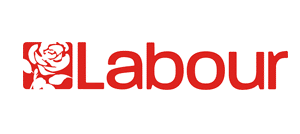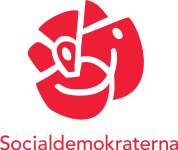Azerbaijan
After years of rule, President Heyder Aliyev died in 2003. His son, Ilham Aliyev, took over the ruling party and his father’s post as president of Azerbaijan. Ilham Aliyev started his first term in October 2003 by cracking down on the opposition protesting his undemocratic election. On 9 October 2013, after months of intimidation and res
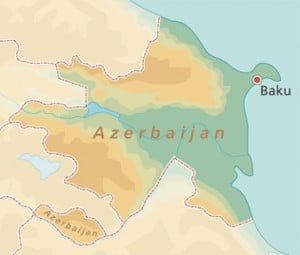
trictions being placed on the opposition, Aliyev was elected for a third term. The opposition bemoaned the lack of political competition, insufficient access to the media and the pressure from the government. The opposition did not have enough opportunity to campaign and oppose the president. The country is additionally burdened by widespread corruption and a deadlock conflict with Armenia over Nagorno-Karabakh.
The constitutional referendum of 26 September 2016 extended the presidential mandate from five to seven years. Moreover, two vice-presidential posts were created and the president was granted the right to schedule early presidential elections and dissolve the parliament. In total, 29 constitutional amendments that strengthen the power of the president and state officials were approved. In 2018, presidential elections were held once more, and unsurprisingly, President Aliyev won again amid mass allegations of voter fraud.
-
Want to get notified by mail when this country gets updated?
Subscribe to our newsflash below!
Key Info
1 Political Situation
The president
Azerbaijan has a strong presidential system with a weak separation of powers. The Azerbaijani constitution empowers the president to appoint and dismiss the government. Following the country’s independence in 1993, elected President Heydar Aliyev, a former Soviet communist leader, ruled the country with his New Azerbaijan Party (YAP) with an iron fist, leaving little room for freedom and democracy. YAP has maintained its absolute majority in the parliament since the marred 2005 elections. After his resignation, his son Ilham Aliyev became president in October 2003. Although it was expected that Ilham Aliyev would deviate from his father’s way of governing and create change for the better, governance remained very much the same and no major reshuffling within government took place. In 2009, following his re-election as president in 2008, Aliyev passed a referendum which removed the presidential consecutive term limit, thereby allowing him to run for president as many times as he would wish to. He was re-elected for a third term in 2013, and a fourth term in 2018. In 2016, as a result of the referendum, the presidential mandate was extended from five to seven years. The president was also granted the right to schedule early presidential elections and dissolve the parliament if it had, twice in one year, adopted no-confidence measures against the government or rejected presidential nominees to the Constitutional Court, Supreme Court, or the governing board of the Azerbaijani Central Bank.
Government
The political and economic system in Azerbaijan is largely based on a pyramidal web of patronage. Clans, mainly based on regional origin as well as the ruling elite, keep the system intact to secure their financial and power interests. Two clans, the Nakhichevanis and Yerazi, have dominated politics for decades. Heydar Aliyev had his origins in both clans, which gave him a strong powerbase. The Aliyev family stands on top of the pyramid and makes sure that key-positions in all spheres of society are taken by closely related and like-minded people. This structure has developed into extensive bureaucracy and corruption. Corruption in all spheres of society poses the largest threat to the functioning of the state. Most ministers have bought their jobs and many are directly related to the president. Moreover, membership of the president’s party, YAP, is a precondition for state employment.
Political issues
Human rights organisations and Western governments expressed their concerns about violations in Azerbaijan during the presidential elections in 2013. International observers from the Organization for Security and Co-operation in Europe (OSCE) criticised the presidential election for failing to meet international standards. It observed counting in 58 per cent of the polling stations to either be bad or very bad. It also claimed that arrests and intimidation of opposition political activists, a restrictive media environment, and violations of the freedom of assembly and association had marred the pre-election campaign.
Political rights and civil liberties
Regarding political rights and civil liberties, Azerbaijan is labeled as ‘not free’ according to the NGO Freedom House. There are limitations to freedom of expression and assembly as well as the rights to liberty and fair trial. The authorities have arrested dozens of political activists on bogus charges, imprisoned critical journalists, broken up several peaceful public demonstrations, and adopted legislation that further restricts fundamental freedoms. Torture and ill-treatment continue under circumstances of impunity. When allegations of beatings, threats, and other forms of abuse are made by arrested political activists in custody, the authorities are known to insufficiently and ineffectively investigate such claims. NGO leaders continue to face threats and harassment from the authorities, including raids by security forces, confiscation of equipment and the imposition of travel bans. Online and social media activities critical of the authorities continue to be prosecuted on fabricated charges, typically drugs-related. Independent journalists continue to face threats, violence and harassment. Azerbaijan was ranked 167 out of 180 countries in the Reporters Without Borders 2021 World Press Freedom Index, which shows the media situation is critical and continues to get worse.
Human rights and gender equality
Not only political rights, but also human rights are limited in Azerbaijan. Multiple human rights violations have been reported, including at two of the biggest events that have taken place in Azerbaijan’s capital Baku. In 2012 Azerbaijan hosted the Eurovision Song Contest. Many journalists covering Eurovision extensively reported on the human rights situation in the country, including interviews with many of those now detained, imprisoned or in hiding. Furthermore, before the 2015 European Games in Baku, organisations and media outlets such as Human Rights Watch, Amnesty International, Platform London and The Guardian staff were all prevented from entering Azerbaijan.
Gender equality in Azerbaijan is limited. In May 2021, the NGO Amnesty International released a statement calling to stop gender-based reprisals in Azerbaijan. Female human rights defenders face threats, coercion and violations of their right to privacy in smear campaigns targeted specifically towards women. Furthermore, traditional norms within society restrict women’s roles: care work is mostly done by women while men remain responsible for supporting their family and continue to dominate decision-making power in intimate relationships. This is shown in the political division between men and women: though there are no legal restrictions against the participation of women in politics, the percentage of female members of parliament remains low: 17.6 in 2020.
Gender inequality takes another form for the LGBT+ community. Homophobia is widespread, and Azerbaijan ranks the worst place in Europe to be gay, bisexual and trans. In 2017, the police in Baku detained dozens of people on dubious charges, beating and using electric shocks on some of them to coerce bribes and information on other gay men. Traditional values are often exploited to justify violence against the LGBT+ community. Officially, same-sex conduct was decriminalized in 2000, but the community continues to face discrimination and prosecution.
Nagorno-Karabakh conflict
The Nagorno-Karabakh region is the mountainous territory in the west of Azerbaijan, inhabited by about 150,000 people. It had been part of Armenia until 1923 when Stalin decided to merge it into the Socialist Republic of Azerbaijan, granting the area the status of an autonomous region. Nagorno-Karabakh became de facto independent from Azerbaijan after a war in the early 90s that ended with a truce signed in 1994 but which has nonetheless not led any country to recognise the region as an independent state. Since then, no peace agreement has been found and the situation is referred to be a “frozen conflict”. Tensions remain concerning the area and to which country it belongs: Armenia or Azerbaijan.
Tensions escalated once again in 2020 between the two countries. With both sides prepared for sustained fighting and with Azerbaijan supported by Turkey, a six-week war erupted in the area, costing thousands of lives before it was halted. As a result of the war, Azerbaijan claimed the territory in and around Nagorno-Karabakh, previously controlled by Armenia. More than a third of the population of the area now controlled by Azerbaijan became internally displaced, often fleeing to the Armenian capital. In November 2020, a Russia-led ceasefire was established to end the fighting: Azerbaijan kept the territory it reconquered in the war, and was given control of seven territories surrounding Nagorno-Karabakh previously held by Armenia. Furthermore, Russian peacekeepers were deployed to the parts of Nagorno-Karabakh that were controlled by Armenian forces.
The situation surrounding Nagorno-Karabakh remains volatile. The opposing military groups are now only separated by 30-100 meters, much closer than before the 2020 war and closer to civilian settlements. Those crossing the border, intentionally or not, are often detained directly, and a number of Armenian prisoners of war have still not been returned to Armenia by Azerbaijani authorities. Since then, Armenia and Azerbaijan have sued the other for crimes in front of the United Nationals International Court of Justice and the European Court for Human Rights respectively, and tensions remain in the border areas.
Since April 2022, Azerbaijan and Armenia are negotiating a new peace deal, mediated by western powers. On April 7, 2022, Pashinian and Azerbaijani President Aliyev met in Brussels alongside European Council President Charles Michel. Lately, progress has been made in the peace talks, with both parties seemingly ready to make concessions. Baku requests a mutual recognition of each other’s territorial integrity – Pashinian said this was acceptable for his government.
Nonetheless, the conflict escalated again on September 13, 2022 after large-scale clashes between Azerbaijan and Armenia culminated in the deaths of at least 200 soldiers. The Azerbaijani side indicated it was responding to Armenian provocations. A new ceasefire agreement was announced on September 15, 2022, which has proved fragile to date.
On 19 September 2023, Azerbaijan launched an attack on Nagorno-Karabakh. Within a day, the Armenian authorities were defeated and announced the region would seize to exist starting on 1 January 2024. As the ethnic Armenians being scared of repression, the region was deflated of its population as almost everyone left the region in a mass exodus.
2 Elections
Electoral System
On a national level, Azerbaijan elects a head of state – the president – and a legislature. The head of state and head of government are separate from the country’s law-making body. The president is both the head of the state and head of the executive branch. The president is elected for a five-year term by the people. The position was limited to two terms, but since 2008, the constitution of Azerbaijan was amended, abolishing any term limit for the office of president. The president appoints all cabinet-level government administrators (ministers, heads of other central executive bodies). The people elect the president; the prime minister is appointed by the president and confirmed by the National Assembly of Azerbaijan.
The National Assembly (Milli Məclis) has 125 deputies. Before 2005, 100 members were elected for a five-year term in single-seat constituencies and 25 members by proportional representation. Since 2005, all 125 members are elected in single-seat constituencies. Azerbaijan is a one-party dominant state. Opposition parties besides the New Azerbaijan Party are allowed but are widely considered to have no real chance of gaining power.
The Constitutional Referendum of 2009
The presidential term that had previously been set to five years and allowed the president to be re-elected only once, was reviewed by means of a referendum on 18 March 2009. Citizens were consulted on whether President Aliyev should be granted the right to run for an unlimited term starting 2013. Despite opposition calls to boycott the poll, there was a turnout of 71 percent.
92.2 percent voted for scrapping the limit. Prior to the referendum, polls already showed that many citizens would vote “yes” as they see their president as the man that played a crucial role between 2003 and 2007 – a period in which the country’s GDP expanded by an average of more than 20 percent per year, making it one of the fastest-growing economies worldwide. Supporters said they are committed to democracy, but that abolishing term limits “would help protect the country from political and economic instability”. The Congress of Local and Regional Authorities of the Council of Europe nevertheless stated that constitutional amendments violate democratic commitments made by Baku in 2002. According to the president of the congress, with the implementation of the amendments, Baku’s delegation jeopardises its CoE membership.
Parliamentary elections
Parliamentary elections
The latest parliamentary elections in Azerbaijan were held on February 9th 2020. The elections were originally scheduled for November 2020, but after the parliament was dissolved in December 2019 they were moved forward. The OSCE observation mission, as well as the Azerbaijani opposition, stated that despite the high number of candidates the restrictive legislation and political environment prevented genuine competition in the elections. Many candidates used social media to reach out to voters, but this did not compensate the absence of campaign coverage in traditional media. Therefore, voters were not provided with a meaningful choice due to a lack of real political discussion. The ruling New Azerbaijan Party retained its majority, winning 72 of the 125 seats, although this was later reduced to 70 when results in two constituencies were annulled. The second largest party (the Civic Solidarity Party) won only three seats.
Election results
| Party | Number of seats | +/- |
| New Azerbaijan Party | 70 | +1 |
| Civic Solidarity Party | 3 | +1 |
| Whole Azerbaijan Popular Front Party | 1 | 0 |
| Great Order Party | 1 | 0 |
| Motherland Party | 1 | 0 |
| Party for Democratic Reforms | 1 | 0 |
| Unity Party | 1 | 0 |
| Civic Unity Party | 1 | 0 |
| Azerbaijan Democratic Enlightenment Party | 1 | 0 |
| Azerbaijan Social Prosperity Party | 0 | -1 |
| National Revival Movement Party | 0 | -1 |
| Social Democratic Party | 0 | -1 |
| Independents | 41 | -2 |
| Invalidated | 4 | |
| Total | 125 | |
| Registered Voter Turnout: 46.84% (5,359,015 million) |
Presidential elections
On April 11, 2018, Azerbaijani voters could cast their ballots for the presidential elections. Even though eight candidates participated in the election, it was a forgone conclusion that the incumbent president Ilham Aliyev would win the election. It was the first election since the constitutional referendum that gave the president more power. The elections were called early (rescheduled from October to April)
| Candidate | Number of votes | Percentage |
| Ilham Aliyev (New Azerbaijan Party) | 3,394,898 | 86.02% |
| Zahid Oruj (independent) | 122,956 | 3.12% |
| Sardar Mammadov (Azerbaijan Democratic Party) | 119,621 | 3.03% |
| Gudrat Hasanguliyev (Whole Azerbaijan Popular Front Party) | 119,311 | 3.02% |
| Hafiz Hajiyev ( Modern Equality Party) | 59,924 | 1.52% |
| Araz Alizadeh (Social Democratic Party) | 54,533 | 1.38% |
| Faraj Guliyev (National Revival Movement Party) | 45,967 | 1.17% |
| Razi Nurullayev (independent) | 29,229 | 0.74% |
Repression
In a highly controlled environment, voter fraud seemed to have been widespread. Azerbaijan’s Central Election Commission (MSK) installed web cameras at more than 1,000 polling stations, claiming that this would make “the activity of the commission […] transparent to voters.” However, the live streaming cameras caught several suspicious incidents in which even MSK members seem to engage in voter fraud. One video showed how MSK members appeared to have switched a ballot box. In other instances, MSK members didn’t react to dubious or flat-out fraudulent incidents in polling stations, making it possible for others to stuff ballot boxes and vote multiple times at different polling stations. Based on these kinds of incidents, the opposition party, the National Council of Democratic Forces, claimed that only about 15 percent of the electorate voted instead of the reported 75 percent by the MSK.
The MSK stated that the elections went superbly. The commission attacked several media outlets, especially the Berlin-based Azerbaijani Meydan TV, for claiming otherwise. “Some social media forces who are interested in casting a shadow on democratic and transparent elections […] disseminate false information that is not true and is not based on the facts.” Meydan reacted to the allegations that Azerbaijan not only targeted independent media with words but also physically. Several journalists were reportedly intimidated, denied access to polling stations, and one journalist was even assaulted.
3 Political Parties
Social Democratic Parties
The founding conference of the Social Democratic Party was held in December 1989, with most of the original members coming from the Popular Front. The party was the first non-communist and opposition party to be officially registered (1989). When Ayaz Mutalibov was President of the Republic of Azerbaijan, the party had one Member of Parliament, which was Araz Alizadeh, the present co-chairman of the party. After that it failed to win seats in all the subsequent elections.
After the death of Araz Alizadeh, the party has been dissolved in April 2023.
Other Parties
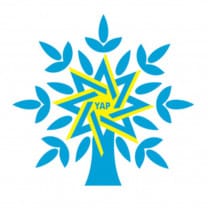
Number of seats: 69
The YAP is the ruling party of Azerbaijan. It was formed by Heydar Aliyev in 1993 to support his political career. Many high functions in the party are given to members of the Aliyev family. Since the dead of Heydar Aliyev, his son Ilham Aliyev took over the presidency of the country and the leadership of the party – of which he was first deputy chairman.
The party is especially strong in the region of Nakhichevan and is dominated by people from this district. Former communist officials are also strong within the party. The YAP first institutionalised its power during the 1995 parliamentary elections, when it won an absolute majority of seats and effectively transformed the legislation into a body loyal to the president. It remains firmly in power by rigging the elections and oppressing the opposition.
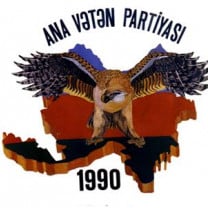
Number of seats: 1
The Motherland Party is a small pro-governmental party, which was established in 1990. Since 1993 it switched its allegiance to Heydar Aliyev and his party. Many members are from the same region in Armenia as Heydar Aliyev. The leader, Fazail Agamali, is a former Deputy Minister for Social Protection.
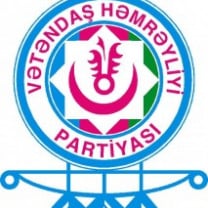
Number of seats: 3
The Civic Solidarity Party was founded in 1992 and is ever since led by Sabir Rustamkhanli. The leader was Press and Information Minister in the period from 1991 to 1995. The VBP is an opposition party and member of the Democratic Congress since 1998. Main idea is the civil unification of Azerbaijani people and its ideology is based on the "the universal political values of freedom, equality and solidarity. Rustamkhanli rejected a medal of honour awarded by president Aliyev in 1998 and was nominated as presidential candidate in the 2003 elections, in which he received 0.8 percent of the votes.
4 Biographies
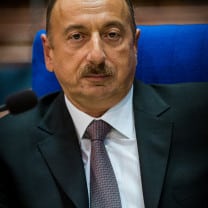
Born in 1961, Ilham Aliyev, son of former president Heydar Aliyev, studied International Relations at the Moscow State University after which he gained his PhD in history. In 1994, he became vice-president of State Oil Company of Azerbaijan (SOCAR). He participated as one of the key figures in the negotiations between the Azerbaijani government and Western oil companies during the conclusion of new contracts now known as the Contract of the Century. The following year, Aliyev was elected to the National Assembly of Azerbaijan.
In August 2003, two months before the presidential elections, he was appointed Prime Minister. In October, Heydar Aliyev, suffering from failing health, stepped down as president and in a controversial move appointed his son, an independent candidate, as his party's sole presidential candidate. According to the official outcome of the elections, Aliyev gained 76.84 per cent of the votes, which was heavily contested by the opposition.
His presidency is marked by a lack of improvement in both democratic standards and its human rights record. Repeated protests were staged against Aliyev's rule in 2011, calling for democratic reforms and the ouster of the government. Aliyev has responded by ordering a security crackdown, using force to crush attempts at revolt in Baku.
Subscribe to our newsletter
